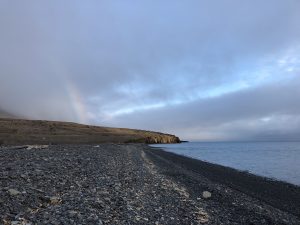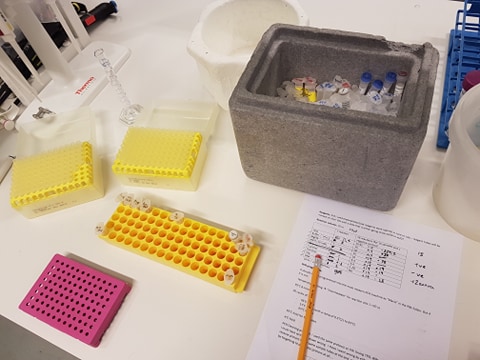When I arrived in Longyearbyen my expectations for the internship were quite high. I thought the internship would give me a lot of practical skills that would help me sort out which part of research I liked before starting my master degree in the fall. I was looking forward to helping out collecting and processing samples, learning more about how to run research projects in remote places and arctic conditions, maintaining lab and field equipment, and to utilize as many machines, instruments and methods in the lab as possible.
The lab activity in January is less intensive than in the spring/summer season. Therefore, the internship started out a bit slow. Since I like to be on top of things, I had to ask for tasks in the beginning, and I got a lot of cleaning and sorting out labs for the professors. I mostly got tasks that did not really utilize any of my previous biology knowledge at all. That was a bit disappointing, but I was happy to get started. In late February and the beginning of March I started getting more relevant tasks and also trying something new. Stuart showed me how to do PCR, and also explained everything really well. I was really happy to finally doing some “real” biology stuff. I felt like I was learning something new and exciting and that I finally utilized some of my biology skills. Of course, I understand that you also utilize some skills when you write a paper or report, but that is not why I am here. Utilizing my biology skills that way is what I have mostly done so far in my degree, and I am here because I wanted to get more practical skills.
Unfortunately, UNIS closed down right after on March 12th and my internship changed completely. From gaining practical skills, it changed into me sitting in my room writing and investigating things on my computer. I have been really disappointed. In the beginning I felt a bit left out since my contract says that I am supposed to be a part of the everyday activities at my work place, but after a talk with the head of the department I have been much more included and it has been really interesting to see how they work and cooperate throughout the Covid-19 crisis.
One of the questions I have been asked is if my view of what a biologist can contribute to society changed during my internship, and I don’t think it has. Mostly because I understand that if 100 biologist graduate one year, some might work in the education system, some might work with environmental management, some might work in the municipality with pollution or waste, and perhaps a few will become researchers. Still, I came to Longyearbyen not because I wanted to work as a teacher, instructor, or advisor, but because I am curious about research opportunities. At the same time, I have gained some more knowledge about a researcher life, and I have also gotten some contacts for future possibilities.





